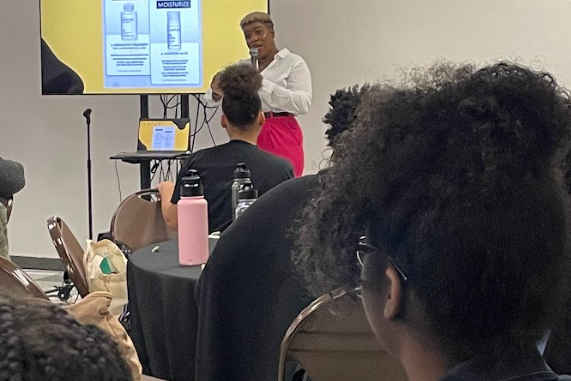
By Amira Turner
Despite being part of a daily routine, hair in the Black community has historically been a source of conflict, misinformation, and discrimination. On May 9, Brooklyn College’s Women of Color club (WOC), in partnership with the organization The Curly Code, hosted their “Spring into a New Beauty Routine” event in an attempt to combat these issues. The event focused on educating Black students on how to take care of, and love, their hair.
Within academia, Black students experience higher levels of scrutiny based on their hair. In a 2020 survey presented at the National Association for Multicultural Education Conference, 70% of school dress codes audited included mentions of hair, a majority of which forbid Black hairstyles including afros and braids. WOC president Widom Obadofin shared with The Vanguard the impact she hoped the event would have on the BC Black community in helping to increase awareness and acceptance of Black hair care.
“We felt that it was very important that our final events leave an impact on the students community. We wanted to enjoy the fun and curious side of a beauty routine in a safe space, a space where all products we recommend are actually useful for our members and also are specifically created for them,” Obadofin said.
The Curly Code founder Emmanuelle Duroska presented about “wash day,” a Black hair-care ritual that is crucial to the self-care process. The presentation walked guests through the most important steps of wash day, from shampooing and conditioning to moisturizing and drying. She emphasized the importance of wash day, even for people who struggle with dry hair. “You can’t say, ‘I’m gonna drink a gallon of water on Sunday and I’m gonna be good,’ that’s not how that works, so you want to give your hair a lot of contact with water on a regular basis,” she said.
In a survey conducted by The Perception Institute, 29% of Black women surveyed reported that they worried “a lot” about their hair, compared to only 16% of their white counterparts. This disparity comes from a long history of shame associated with Black hair, especially in the workplace. This is a disparity The Curly Code is working hard to fight against.
“We live in a society that has repeatedly told us that we’re not good enough and or we’re not pretty enough etc. and that is a bold-faced lie,” Duroska told The Vanguard, “I think the internalized hate for your hair, is that you just don’t know it.”
Leaders of WOC expressed that care is a crucial first step to finding security within oneself and in the larger beauty community.
“All hair is great hair, and all skin is great skin once you know how to take care of yours,” said Obadofin.
Dispelling misinformation about Black hair care products is another key component of educating about how to care for and love hair, according to organizers. Market data from Gitnux reports that the Black hair care industry is valued at around $2.5 billion, but more often than not Black consumers are unaware of the products meant for their hair types.
“[The event] was an opportunity to try new products from brands I wasn’t familiar with, and products I wouldn’t normally reach for,” Darla Moise, a Undergraduate Student Government (USG) senator and senior at BC, told The Vanguard.
Along with the chance to try treatments and learn about different products, participants were able to try out and take home products from brands such as Odele, Olaplex, Rare Beauty, Not Your Mothers, and more.
Duroska hopes that every woman can feel confident in their own hair, fostering a hair care community that is inclusive to all.
“We’re making sure that girls are leaving feeling empowered and ready for their next wash day,” she said. “I also want them to leave with a sense of community.”
WOC hopes it will continue to be a beacon of support for the women of color on campus as they go about their academic careers and beyond. Even as the semester comes to an end, WOC will make sure this population of students will continue to be heard.
“There’s not a lot of space for us to be ourselves and get the resources we need outside of academia,” Obadofin told The Vanguard. “BC students should know that WOC is here to continue pouring into them. Our community is our number one focus, and we prioritize them sincerely.”
